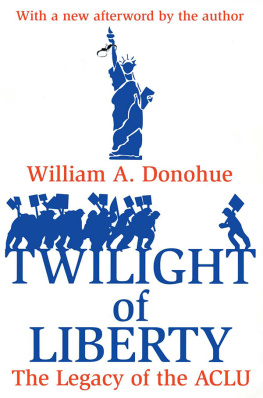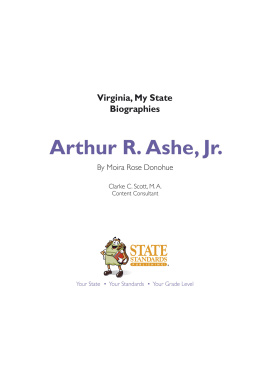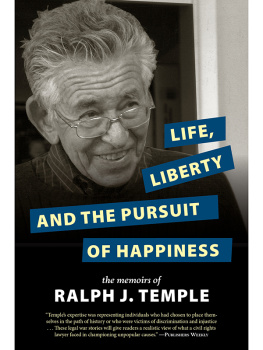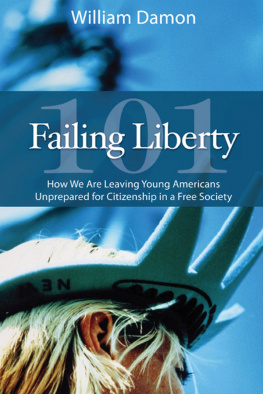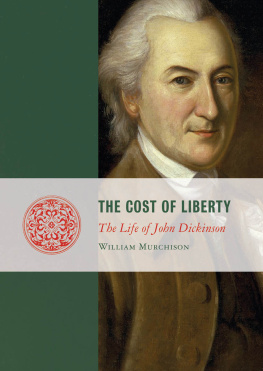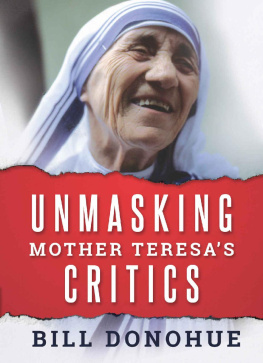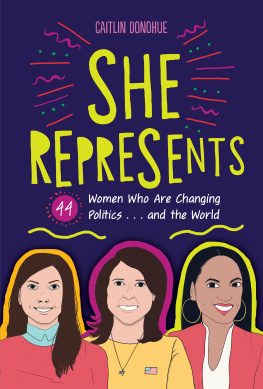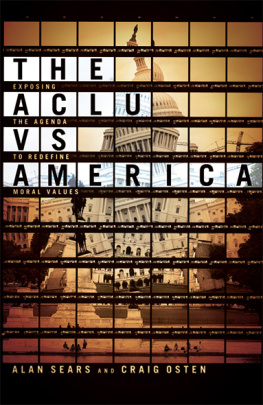First published 1994 by Transaction Publishers
Published 2017 by Routledge
2 Park Square, Milton Park, Abingdon, Oxon OX14 4RN
711 Third Avenue, New York, NY 10017, USA
Routledge is an imprint of the Taylor & Francis Group, an informa business
All rights reserved. No part of this book may be reprinted or reproduced or utilised in any form or by any electronic, mechanical, or other means, now known or hereafter invented, including photocopying and recording, or in any information storage or retrieval system, without permission in writing from the publishers.
Notice:
Product or corporate names may be trademarks or registered trademarks, and are used only for identification and explanation without intent to infringe.
Library of Congress Catalog Number: 00-059931
Donohue, William A., 1947-
Twilight of liberty : the legacy of the ACLU / William A. Donohue[Rev. ed.]
p. cm.
Includes bibliographical references and index.
ISBN 0-7658-0722-X (pbk.: alk. paper)
1. American Civil Liberties Union. I. Title
JC599.U5 D666 2000
323'.06'073dc21
00-059931
ISBN 13: 978-0-7658-0722-9 (pbk)
Over the years, I have had basically two central criticisms of the American Civil Liberties Union: (a) it is not the nonpartisan organization it pretends to be and (b) it hurts the cause of liberty by taking an extremist interpretation of individual rights. Having dealt with the first issue in The Politics of the American Civil Liberties Union, it made sense to do a sequel, one that would address the second issue.
This book is different from my first book on the ACLU in several ways. The first book sought to debunk the idea that the ACLU is above politics; this book tries to show how the ACLU undermines the process of liberty. The first book was both thematic and historical, covering the years 1920 to 1984; this book is a contemporary analysis of the ACLU, focusing on events of the last ten years. Those who have read the first book will find that almost all the work in this book is new. Unavoidably, there are some events that must be restated; otherwise, the reader is left without a sense of how events have unfolded. But because this book is fundamentally different from my previous effort, it does not presuppose that the reader has already read The Politics of the American Civil Liberties Union.
The purpose of this preface is to discuss some important material that does not directly relate to the thesis of this book; the introductory section that follows will do that.
Since my first book on the ACLU was published, I have met many former ACLU members, most of whom joined in the 1940s, 1950s, or early 1960s. Virtually without exception, the reason they left was the increasing politicization of the Union. As my previous book showed, the years these members joined were the most balanced in the ACLUs history. But beginning in the late 1960s, the ACLU steered left, leaving behind those civil libertarians who joined for principled reasons.
Perhaps the most famous person who parted ways with the ACLU was Dick Thornburgh, former board member in Pittsburgh, governor of Pennsylvania, and former attorney general of the United States. Other former officials, like Eugene Feldman of Pennsylvania, have gone public with their denunciations of the Union, holding that the ACLUs new agenda is politics, foreign policy and sociology. Some of those leftists, like William Kunstler, raise disturbing questions about how seriously the ACLU takes its own constitution.
Kunstler is a long-time member of the National Advisory Council, and according to the ACLUs constitution, that means that he must be unequivocally committed to civil liberties. The ACLU, obviously, provides Kunstler with just the sort of legitimate outpost he wants.
Over the past several years, I have mentioned to several ACLU officials the incongruity of allowing partisans like Kunstler to serve on one of the Unions governing boards. The usual reply is that (a) the National Advisory Board is not one of the governing boards, or (b) Kunstler has little influence, or (c) it doesnt matter a whole lot. Those who give the first reply are unaware that the ACLUs constitution lists the National Advisory Board as one of its governing bodies. As to the second reply, the point is not whether Kunstler has much influence; rather, it is whether he ascribes to the principles of the organization. And to say that it doesnt matter is unconvincing. It is doubtful that the ACLU would accept an extreme right-winger as a member of one of its governing boards (with good reason). So why permit extreme leftists?
Part of the problem is that the ACLUs interpretation of ideological extremism is narrowly drawn. To be specific, the Union sees extremism as emanating from just one direction: the right. That is why it continues to have a policy on The Ultra-Right but none on The Ultra-Left. For example, its policy on The Ultra-Right speaks about the problem of extremist organizations without ever acknowledging that organizations on the left might also fit the mold.
Perhaps a better index of the ACLUs politics can be gleaned from the scorecard that it tallies on the voting record of congressmen and senators. Each year the ACLU presents a list of what it determines to be the key civil liberties issues as voted on by Congress. It scores each representative and senator as either agreeing or disagreeing with its position. Data from 1983 to 1990 reveal the following scores: Senator Edward Kennedy of Massachusetts and Congressman Don Edwards of California agreed with the ACLUs position 93 and 99 percent of the time, respectively. But Senator Alfonse DAmato of New York and Congressman Henry Hyde of Illinois garnered a rating of only 16 and 12 percent, respectively. To those who claim the ACLU is nonpartisan, these results must be seen as an anomaly; to those who know better, the results are as unremarkable as they are predictable.
The standard ACLU response to charges of partisanship is a citation of its defenses of Nazis, Klansmen, and conservatives like Lt. Col. Oliver North. Now the record will show that there are both principled and politically expedient reasons why the ACLU has made these exceptions. Though they are in a minority, there are still some officials who are principled civil libertarians; hence, their willingness to defend people independent of political bent. The reader should know that although I admire the consistency of this position, I personally think it important to distinguish between Nazis and non-Nazis on the right. In the concluding section, a full explanation of this position is offered. In any event, there is nothing noble about the way some others in the ACLU view the issue.
To most ACLU activists, the occasional defense of a Nazi or Klansman costs little. After all, these extremists are hardly in a position to win. Furthermore, it is good for public relations to appear nonpartisan, especially when the case in point is sure to garner high visibility. Consider, too, what the ACLU founder Roger Baldwin had to say about this matter in 1934: If I aid the reactionaries to get free speech now and then, if I go outside the class struggle to fight against censorship, it is only because those liberties help to create a more hospitable atmosphere for working class liberties. In other words, the occasional defense of right-wing extremists opens up the courts, thereby making it easier for the ACLU to defend its ideological kinfolk on the left. [The ACLU opposed the Wagner Act, so it cannot seriously be maintained that by working class liberties Baldwin was implying elementary rights for workers.]


